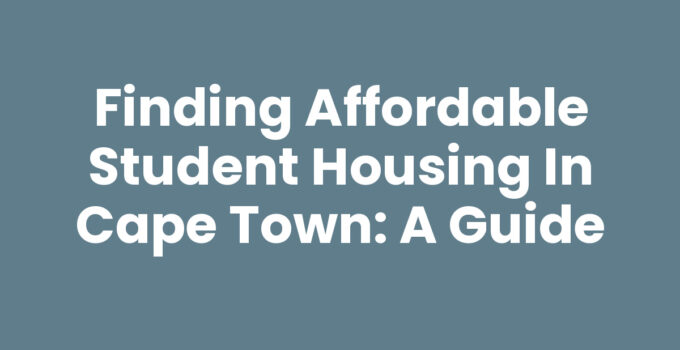When it comes to pursuing your studies in one of South Africa’s most vibrant cities, finding the right accommodation can significantly impact your overall experience. Cape Town is not just famous for its stunning landscapes and rich culture, but it also offers a wide variety of student housing options. Whether you are looking for a shared apartment, a dormitory, or an independent studio, this guide will navigate you through all the possibilities of student housing in Cape Town.
Student Housing In Cape Town: A Step-by-Step Guide
Finding student housing in Cape Town requires strategic planning and knowledge about the local rental market. Here’s a comprehensive step-by-step guide to help you make an informed decision:
1. Determine Your Budget
Budgeting is the first step. Consider your monthly income and other expenses. In general, student accommodation in Cape Town can range from R3,000 to R10,000 per month. Always keep some funds aside for utilities, groceries, and transportation.
2. Research Your Options
There are several housing options available for students in Cape Town:
- Shared Accommodation: Renting a room in a shared apartment or house helps to lower costs and offers social interaction.
- Private Rentals: If you prefer having your own space, look for studio apartments or one-bedroom flats.
- University Dormitories: Most universities offer on-campus housing that is typically more affordable compared to off-campus options.
- Student Residences: These are privately managed student housing complexes that often include amenities tailored to students.
3. Choose Your Location Wisely
Location is crucial in determining your daily commuting time and safety. Some popular neighborhoods for students are:
- Observatory: Known for a student-friendly vibe and close proximity to the University of Cape Town (UCT).
- Rondebosch: Home to several schools and universities, making it a preferred choice for students.
- Woodstock: Offers affordable options and a rich cultural scene with easy access to public transport.
4. Visit Properties
Once you have a shortlist of potential places, visit them to assess the conditions. Take note of the following:
- Maintenance standards
- Proximity to public transport and shops
- House rules, especially regarding visitors or noise
5. Understand Your Lease
Before signing any lease, ensure you thoroughly read the contract. Look out for:
- Duration of lease – are you locked in for a year?
- Deposits required – typically equal to one month’s rent
- Rules about subletting
- Provision for maintenance and repairs
Make sure to negotiate any questionable terms before finalizing your agreement.
6. Move In and Settle Down
Once you’ve secured your housing, it’s time to move in. Here are tips for settling in:
- Connect with housemates for a harmonious living arrangement.
- Explore the local area and get familiar with nearby amenities.
- Join local student groups or communities to stay socially connected.
Recommended Guide: Discover Cape Town Jobs No Experience: Start Your Career Today
Key Considerations When Choosing Student Housing In Cape Town
Choosing the ideal student housing requires several considerations beyond just the rental price. Here are some key factors to think about:
- Transportation Options: Access to reliable public transportation can make a big difference in your daily commute.
- Safety: Ensure the neighborhood is safe, especially if you’ll be commuting late at night.
- Internet Access: Look for housing options that provide high-speed internet, crucial for your studies.
- Lease Flexibility: Understand what happens if you need to leave before your lease ends.
See Also: Experience The Lookout Deck Hout Bay Cape Town: A Culinary Gem
Benefits of Living in Student Housing In Cape Town
Choosing the right student accommodation can lead to numerous benefits, including:
- Social Connections: Living with other students offers the chance to make friends and create a support network.
- Collaborative Study Environment: Access to study groups and resources often leads to better academic performance.
- Community Engagement: Many student housing options organize events that foster a sense of community.
In conclusion, student housing in Cape Town presents a multitude of opportunities for learners to thrive academically and socially. By being diligent in your research and understanding your personal requirements, you will find the perfect place that meets your needs while enjoying everything this stunning city has to offer.
Further Reading: Train Schedule Cape Town: Your Ultimate Guide to Travel
Frequently Asked Questions
What are the average costs for student housing in Cape Town?
Student housing costs in Cape Town typically range from R3,000 to R10,000 per month, depending on the type and location.
Are utilities included in the rent for student housing?
It varies by accommodation type. Some shared houses may include utilities, while others may require you to pay them separately.
How can I find available student housing options in Cape Town?
You can use online platforms, university notice boards, and local real estate agents to find available student housing listings.



